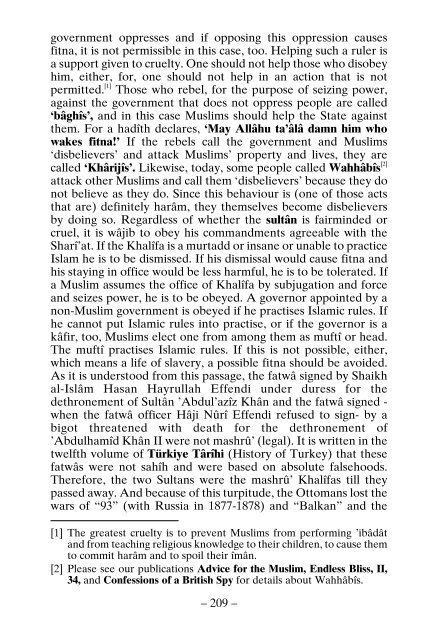Islams Reformers
The bigotry of the religion reformers or bigots of science who surfaced lately to blame all previous scholars, basic fundamental beliefs or practices
The bigotry of the religion reformers or bigots of science who surfaced lately to blame all previous scholars, basic fundamental beliefs or practices
Create successful ePaper yourself
Turn your PDF publications into a flip-book with our unique Google optimized e-Paper software.
government oppresses and if opposing this oppression causes<br />
fitna, it is not permissible in this case, too. Helping such a ruler is<br />
a support given to cruelty. One should not help those who disobey<br />
him, either, for, one should not help in an action that is not<br />
permitted. [1] Those who rebel, for the purpose of seizing power,<br />
against the government that does not oppress people are called<br />
‘bâghîs’, and in this case Muslims should help the State against<br />
them. For a hadîth declares, ‘May Allâhu ta’âlâ damn him who<br />
wakes fitna!’ If the rebels call the government and Muslims<br />
‘disbelievers’ and attack Muslims’ property and lives, they are<br />
called ‘Khârijîs’. Likewise, today, some people called Wahhâbîs [2]<br />
attack other Muslims and call them ‘disbelievers’ because they do<br />
not believe as they do. Since this behaviour is (one of those acts<br />
that are) definitely harâm, they themselves become disbelievers<br />
by doing so. Regardless of whether the sultân is fairminded or<br />
cruel, it is wâjib to obey his commandments agreeable with the<br />
Sharî’at. If the Khalîfa is a murtadd or insane or unable to practice<br />
Islam he is to be dismissed. If his dismissal would cause fitna and<br />
his staying in office would be less harmful, he is to be tolerated. If<br />
a Muslim assumes the office of Khalîfa by subjugation and force<br />
and seizes power, he is to be obeyed. A governor appointed by a<br />
non-Muslim government is obeyed if he practises Islamic rules. If<br />
he cannot put Islamic rules into practise, or if the governor is a<br />
kâfir, too, Muslims elect one from among them as muftî or head.<br />
The muftî practises Islamic rules. If this is not possible, either,<br />
which means a life of slavery, a possible fitna should be avoided.<br />
As it is understood from this passage, the fatwâ signed by Shaikh<br />
al-Islâm Hasan Hayrullah Effendi under duress for the<br />
dethronement of Sultân ’Abdul’azîz Khân and the fatwâ signed -<br />
when the fatwâ officer Hâji Nûrî Effendi refused to sign- by a<br />
bigot threatened with death for the dethronement of<br />
’Abdulhamîd Khân II were not mashrû’ (legal). It is written in the<br />
twelfth volume of Türkiye Târîhi (History of Turkey) that these<br />
fatwâs were not sahîh and were based on absolute falsehoods.<br />
Therefore, the two Sultans were the mashrû’ Khalîfas till they<br />
passed away. And because of this turpitude, the Ottomans lost the<br />
wars of “93” (with Russia in 1877-1878) and “Balkan” and the<br />
[1] The greatest cruelty is to prevent Muslims from performing ’ibâdât<br />
and from teaching religious knowledge to their children, to cause them<br />
to commit harâm and to spoil their îmân.<br />
[2] Please see our publications Advice for the Muslim, Endless Bliss, II,<br />
34, and Confessions of a British Spy for details about Wahhâbîs.<br />
– 209 –

















